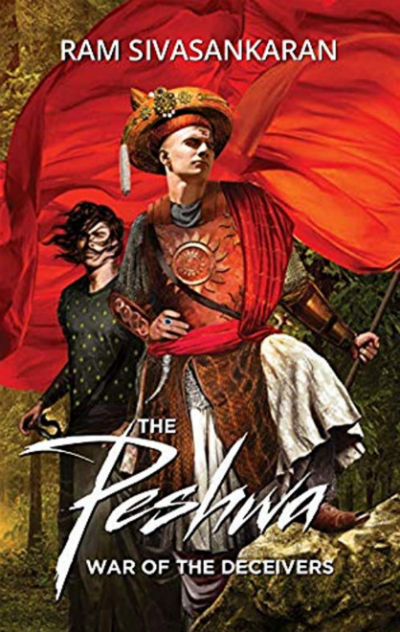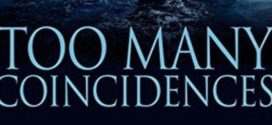Bajirao Ballal aka Peshwa Bajirao Bhat, the son of Balaji Vishwanath was an unmatched warrior and military strategist we’ve seen in the recent Indian history. It pains to see such a remarkable warriors don’t get the due in the history. It is in an irony that people come to know about him through commercial films. Are we failing the historical figures from our own land by ignoring them?
This Is Here In For You
Listen To The Podcast:
If you love to listen to the book review over reading, or if you want to go through it while doing other activity, here is our Podcast of this review article. Do listen, and share your thoughts with us.
Spotify:
YouTube:
History is never absolute and everyone, including the historians, have their own perspective. It is not said that “history is written by the winners” for nothing. Being ignorant and having lack of knowledge and curiosity to explore history through logical means, doesn’t let us expose to the events as they possibly could have happened.
Some people may argue that things are already bygone, why to worry about. Well, it is the chain of actions which is responsible for our present and if we don’t learn from it, the future will be affected too. So, it is even a kind of selfish requirement for us to explore the history from “as neutral as possible” angle.
So, we were curious to explore the historical fiction about Peshwa Bajirao in the form of a book. And thus we’re stumbled upon reading a book named “The Peshwa: The Lion And The Stallion”. And I like the way the author Ram Sivasankaran has explored it. You can see my review for the same at the below given link:
So, recently when the second book The Peshwa: War of the Deceivers in the series is released, we were curious to explore it. We found a fantastic book deal for the same on Amazon India, and we couldn’t let it go. Fortunately, I, from our team get a chance to grab it and read it. So here is what I think about the same.
| Book Title | : | The Peshwa: War of the Deceivers |
| Author | : | Ram Sivasankaran |
| Publishers | : | Westland Ltd.; Published: (4 September 2018) |
| # of Pages | : |
496 (Paperback Edition) 47523 KB, 420 (Kindle EBook) |
| # of Chapters | : | 28 |
| Purchase Link(s) | : |
Let us take a look at the book cover.

The Peshwa: War of the Deceivers by Ram Sivasankaran | Book Cover
I advocate the importance of having an impressive book cover. It doesn’t matter what people say philosophically, but one cannot deny the influence of the book cover on the purchase and/or reading decisions.
The cover page of the book is well thought and the illustrations are impressive. Some of the readers may feel that the illustration of the mustache-less protagonist does not match with the content, however, after reading the (especially the last segment of the same) you will find it is justified. Frankly speaking, I found the cover of the previous book in the series more impressive than this. Possibly red-yellow color background around the mustache-less illustration makes the protagonist look pale, is the reason. The fonts used in the title reminds you of the same from the previous book and thus carries the continuity in the same aspects.
Overall, a good book cover, which could have been better.
Book Plot:
The story takes off from where it was stopped in the previous book in the series – The Peshwa: The Lion And The Stallion. But, if you haven’t read the previous book then also, you can read this book.
Bajirao Ballal – the Peshwa of the Maratha Confederacy is now a figure feared by the opponents and naturally has made some enemies inside as well. Eventually, the Peshwa’s resident is shifted to Pune from Satara. Of course, the main power center remains there in Satara as the throne is there and Chhatrapati lives there. It is a well-thought plan to keep the politics and administration separate. It is a conscious effort to keep the influence or rather we say the interference of the politicians from battle-related decisions which often require swift actions.
The safety of the Peshwa, his family and other remarkable figures in his team also a reason, of course.
The famous Shaniwar Wada is built for the same.
The scorpions – the Mughal assassins who work in the dark and never acknowledged officially are working overtime. They track down those who not only the enemies of the Empire but also those who didn’t stand with the emperor in a tough time and make them meet with a brutal fate. The Peshwa and the people he cares for, are on the hit-list of the scorpions since long, and despite all the efforts by the Peshwa and his spies, they keep losing people to the scorpions.
The leader of the scorpions has a personal account to settle with the Peshwa.
Anaaamik is the most influential figure in Shaniwar Wada and in the Peshwa’s administration and the majority of the people who care for Peshwa hates him. They don’t understand the logic behind The Peshwa’s blind trust in him.
Muhammad Shah, the new emperor on the throne is comparatively young blood and he plans out a multifold attack on the Maratha Confederacy. The plan touched the fate of fort Mandu, the kingdom of Sikhs and yes, the kingdom of Mastani (she is a princess) as well.
How the things unfold is better to be explored by reading the book rather than talking much about it and giving away the spoilers :).
This book is a nice thriller. Of course, it is not easy to write something which deals with history as one need to research a lot and still there remains some gaps while collecting the information about specific stuff. Actually, those are the places where the author can infuse his/her imagination, not only to link the incidents but even to take creative liberties. This book is a historical fiction and there are many things which the author has added to “fill in” those gaps in the historical account. It is, however, written in such a nice way that you will find the things moving ahead in continuity.
There are various tracks going on parallel and you need to remain a little attentive while reading the book. The good thing is, in the end, the author is able to link all these tracks together. The book gives you a thrilling experience while you are exploring the track of Bajirao and Anaamik, the track of growing up Mastani will give you goosebumps at many places and will remind you of real-life bond between father-daughter, siblings among the others.
All the characters in the book are given the proper exposure they require. Though, the protagonist is the Peshwa, of course, but, you will not find the no other character is sidelined. This is the beauty of the book, I will say.
While the previous book in the series was more about the wars and bravery, this one is more about the politics. Of course, there are battles and they are explored in thrilling ways in this book. But, the mind games, war tactics, politics and other stuff of psychological warfare takes precedence in this one.
If you have read just “goody goody” stuff about the Mughal emperors and their time, this one explores the other side of the same. The brutalities performed by Mughal army and its companions, scorpions, and others will make you realize that it was indeed a hard time to live, for those who are on the losing side of the battle.
Ram is good at building scenes and creating the suspense. I will suggest you keep an eye on the “Chimaji Appa Bhat” and “Anaamik” track, and and the end of the book, you will be amused.
While I am trying to keep almost all the spoilers at the bay, let me share some of the pieces of writing form the book which I enjoyed reading.
The book starts with a very realistic yet inspirational quote.
Night, for a soldier, is not for sleep anymore, in these times and lands overrun by men who have no regard for the laws of Dharma. It is the time – a shield and a screen – to raid and destroy an unrighteous enemy who holds no respect for the beliefs we have held, aloft and dear, over aeons.
Bajirao Bhat
(1700-1740), Peshwa and General-Supreme of the Maratha Confederacy
And there are some philosophical yet realistic lines following the same path found later in the book:
What is certain should never frighten us.
We tend to think that life is biased. And, if you see from the perspective of the majority of the people, you find it quite logical. While we see that some people are born in rich or powerful families, life is quite easy for them. Some really have a golden spoon in their mouth since the time they were born. No one can deny the fact that there are benefits of being born or grown up in an influential environment. However, life is not all about the birth and growing up physically. It is much more than that. The struggle and hard work are always there. Of course, there were, are and will be some exceptions for sure. But, more or less, everyone needs to face his/her own challenges and put in his-her efforts.
So, while Bajirao enjoyed second-to-the-supreme-ruler status in the Maratha Confederacy, his life wasn’t the bed of flowers. He always had to remain alert for the safety of himself, his family, friends, loved ones and the citizens. We tend to take many things for granted and often consider having a remarkable number of bodyguards following someone, as a priviledge he/she is enjoying. But, the person who has the privilege might be starving to have a few moments of privacy and freedom.
The book explores these feelings quite well. Shaniwar Wada itself was built like a castle to provide the safety and the security to Peshwa’s family and other remarkable fellows in the administration. The carefree childhood the common citizens used to live, is not available for Baalaji, the son of the Peshwa. I will recommend you to read the track when Kashi needs to take away his son outside of their fort and what happens thenafter.
So, the moments of joy are rare for those who are burdened with the responsibilities. How then they find time to be happy during the war? Well, they still some moments of joy using sarcasm and taking the things lightly.
I do not want the lovely view of my foes being humiliated, ruined by the sight of the derriere of your horse galloping in front of me. Vidyut does not appreciate that either. He thinks he is the fastest horse in our army and he gets restless when he is not in the vanguard himself.
While people often talk about the physical strength and training a warrior required to have, they found to ignore the psychological requirements. It is the mind which plays trick during tough times. The author mentions:
The mind is a masochist. It seeks to relive and imagine things that the body dreads.
And who can disagree? A warrior (especially the leader) needs to remain alert, always. The book, through the mouth of a remarkable character in it, says:
We must take an opportunity when it presents itself- and that day may be today.
The war is not only about knowing one’s own strength. It is more about knowing the enemy’s. Well, it would not be wrong to say that one must know more about his/her enemy than his/her own family, friends or self. The book, at various stages, represents the facts quite effectively during conversation(s) among the Peshwa’s enemies.
The Peshwa is my foe and he will always be that. Restraint is the last thing I would greet him with. However, I will credit Bajirao with what is rightfully due to him. Let us respect the boy for his proven tactical genius – there is no shame in that. It does not make us lesser men to acknowledge a formidable foe for what he truly is. It is in the acknowledgment of an enemy’s strengths that we must seek out his weaknesses too, just like understanding the material that makes up the armour helps us fashion arrowheads strong enough to penetrate it.
— — — — —
… His strength lies in his ability to keep the Confederate Army together and swoop down like a thunderstorm when one least expects him. I would not go so far as to say he is a coward, but his greatest advantage does lie in his ability to spring surprises and sharp maneuvers on unsuspecting and unready soldier.
While we see philosophical yet realistic punchlines in the book which can reach to our hearts and soul like:
War and suffering are not separable.
There are the wisdom lessons which one shouldn’t ignore while reading the book:
More often than not, unwitting sources are more valuable than willing ones. You always talk more liberally and truthfully to the people you trust – wives, parents, sons … mistresses.
And it is the reason which makes people keep some secrets to themselves only. Often not knowing the truth keeps people safe and one always care for the safety of people he/she care for.
Warriors are often found straight-forward and sometimes even arrogant in the way of expressing their feelings. It is their nature of work makes them like that. The wisdom lesson by Chhatarpati Shahu in this book is a good message for them as well.
… Ah, but he is a politician, Govind, And in his profession, he can muster dangerous and unconventional methods to get rid of his enemies, even without an army standing behind him. Learn a thing or two about politics, my boy. Make friends with potential adversaries, or at least, keep them under the illusion of friendship … until you are ready to strike. Never brandish the sword unless you are absolutely ready to bloody it, for then all you are doing is alerting the enemy to prepare and hit back when you let your guard down.
Here are a few more lines from the book which I like:
… A person’s gender is only one of many ingredients that shape their personality. Swap my gender and the dish will be altered. I might have turned out to be someone completely different, perhaps even someone completely different, perhaps even someone immensely undesirable – like kheer seasoned with salt instead of sugar.
The barbaric actions performed by one affects him/her as well.
The fact that the tormented sometimes exceed the tormentors in their capacity for evil.
The book has many characters, including but not limited to, Bajirao, Kashi, Chhatrapati, Farrukhsiyar, Ram Singh, Nizam, Emperor Muhamad Shah, People from Mandu, Mastani, Sikh rulers and soldiers, Anaamik, Chimaji Appa, Rasool, Chhatrasal, Bangash the Butcher, Bundelas, Shirpatrao, Holkar, Scindia, Govindrao, and others. Maintaining balance and giving proper due footage to all them is something the author has done well.
I am not sure that words like “Sahab” and “Sahiba” were used during an internal conversation by Marathi people those days. However, the author has tried to be as discreet as possible, mention of some brutalities a reader to be adult (mentally). Also, the book price (paperback) is quite high, so we recommend you to watch out for an offer on various shopping sites to get the best value for your money.
There are many scenes I like in the book, but exploring them here or talking more about them will definitely bring spoilers here.
Summary:
Overall a genuinely written historical fiction with some good linguistic attributes take a look at a comparatively less explored segment of the history of India. If you like reading historical fictions, you should go for it. It has more positives than the letdowns.
Quick Purchase Links:
- Buy Book From Amazon India – Paperback
- Buy Book From Amazon US – Paperback
- Buy Book From Amazon India – Kindle EBook
At least 8 out of 10.
If you already have read the book do share your remarks and thoughts via comments below. Does this review help you in making your decision to buy or read the book? Do not forget to share this article with your friends over various social networks via Twitter, Facebook, Google Plus and others. And yes, you may like to subscribe to our RSS feeds and follow us on various Social networks to get latest updates for the site to land right in your mail box.
 ThinkerViews – Views And Reviews Personal views and reviews for books, magazines, tv serials, movies, websites, technical stuff and more.
ThinkerViews – Views And Reviews Personal views and reviews for books, magazines, tv serials, movies, websites, technical stuff and more.




A fantastic elaborate review.
Thanks for your words of appreciation.
We read some of your reviews and found them fantastic as well:)
-Team ThinkerViews